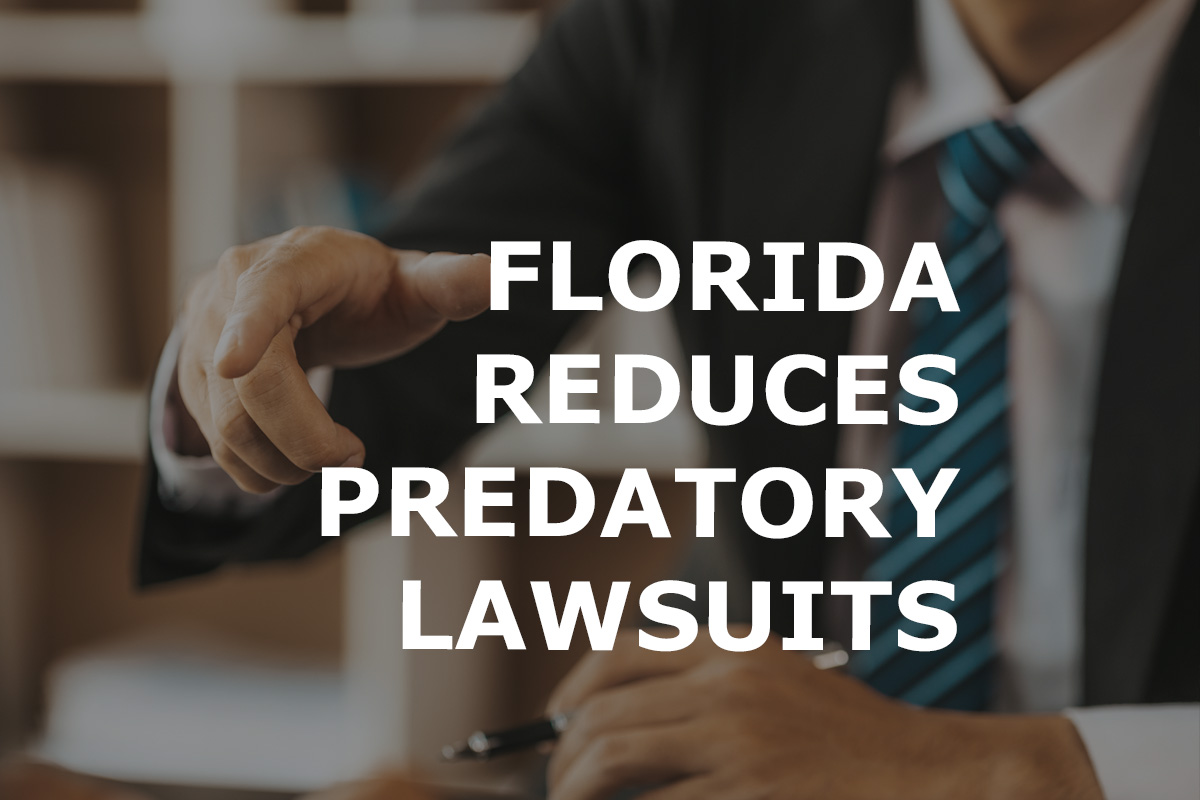On March 24, 2023, Governor DeSantis signed a tort reform bill that should help trucking companies in the state of Florida, effective immediately.
Unfortunately, there are a few bad actors who are in the business to draw out civil cases as long as possible, collecting more and more fees from insurance companies.
Litigation drives up the basic costs of goods and services for everyone across all areas of industry and commerce.
But maybe, in Florida, this will happen less.
House Bill 837 decreases frivolous lawsuits and prevents predatory practices of trial attorneys that prey on all Floridians, including motor carriers.
The bill makes 4 major changes:
- Modifies the bad faith insurance claims,
- Eliminates one way attorney’s fees and fee multipliers,
- Ensures that Floridians can’t be held liable for damages if the person suing is more at fault, and
- Expands immunity for property owners defending against a criminal who is injured on their property while providing uniform standards for juries in calculating medical damages
For carriers, the statute of limitations for negligence claims was reduced from four years to two years, reducing the time trucking companies must defend themselves against claims.
The bill also makes it more difficult for plaintiffs to recover punitive damages that are intended to punish the defendant rather than compensate the plaintiff and will make it more difficult for plaintiff attorneys to secure nuclear verdicts.
[Related: The Beginning of the End for Reptile Theory in Crash Litigation]
With all these changes, it should become less expensive for carriers to defend themselves against claims, fewer lawsuits to have to defend against, and reduce the amount of money carriers would have to pay in damages.
While it may take years, trucking insurance premiums for carriers in Florida should decrease after insurers measure the changing legal climate in Florida.
Or will it?
Florida House Bill 57 threatens trucking insurance rates
According to OOIDA, Florida ranks in the top three most expensive states to insure commercial auto coverage. On average, small-business truckers in Florida are paying over $17,000 a year in premiums per truck, with some well into $30,000.
House Bill 57 would revise the definition of “motor vehicle liability policy” and “risk retention group”.
Risk retention groups are liability insurance companies owned by their members. They allow businesses with similar insurance needs to pool risks and form an insurance company that operates under state regulated guidelines.
The change in the bill would change the definition of a risk retention group as a rated “A” or higher for financial strength and “VIII” or higher for financial size category by A.M. Best Company and which only provides commercial coverage for its members and shareholders.
This change would reduce insurance competition in the trucking market and threaten future rate hikes.
The bill now moves to the Florida House floor for consideration and a similar bill in the Florida Senate, SB516, is slated for a committee hearing on Wednesday.
Maintaining organized driver qualification files reduces lawsuit penalties
Truck accidents are inevitable and more than 50% of these crashes are caused by driver fatigue and driver error, according to statements made by the Pennsylvania State Police motor carrier enforcement unit.
Litigators will look at the crash information and the driver files to find unsafe driver trends. Some of the documents they will look for include driver qualification files, training records, pre-and post-trip inspection reports, daily activity logs, and post-collision alcohol and drug testing results.
[Related: How to protect yourself from truck accident litigation with compliant driver files]If the company handles their hiring and driver qualification process well, there is a reduced chance of litigators finding unsafe driver trends that can harm the company with violations and heavy fines.
This will help you resolve a trucking claim and litigation quickly.
So, what should you look for?
Sometimes companies hire and retain employees who are not qualified to drive a commercial motor vehicle. Other times, the driver’s history and record might be okay, but the company did not build a complete driver file to reflect this.
At a minimum, an annual review of driving performance and insuring driving credentials are valid can reduce unsafe drivers or pinpoint areas where further training could correct bad driving habits.
After an accident, driver information litigators look for:
- governmental agencies responses to inquiries regarding driver records
- driver’s past employment records and employers showing they contacted them (or repeatedly tried to) at the time of the driver’s employment
- driver’s workers’ compensation file
- medical evaluations of the driver
- drug test results, including negative results
- driver training testing documents and company safety meetings attendance
- driver’s DOT file
- prior violations
- driver’s annual reviews
- disciplinary records
Beyond these records, companies need to avoid these common driver file violations:
- not having a current DOT medical card on file
- not having the initial driving record on file (MVR)
- not having a DQ file for each driver that needs one
At CNS, our DQ file management system is completely customizable to your company’s needs. Our DOT Compliance Specialists will ensure all DQ files for your company will be ready to pass an FMCSA audit. Start managing your DQ Files now!
Is your insurance renewal approaching?
If you are interested in a Commercial Truck Insurance quote, please call CNS Insurance at 717.625.0066 or email us at info@cnsinsures.com.
Have some extra time?
Expedite the quoting process by filling out a Complete Insurance Quote with all your vehicle and driver information.






